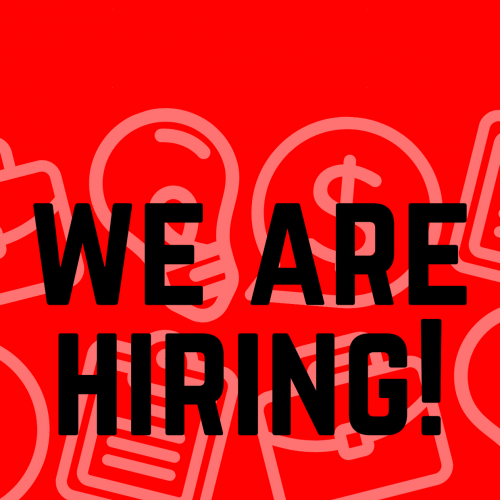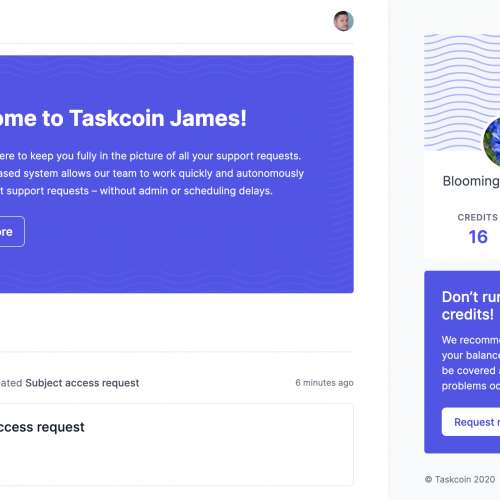 Mark Williamson is the Co-Founder and CTO of Hanzo Archives, a company offering website and social media archiving to businesses and organisations.
Mark Williamson is the Co-Founder and CTO of Hanzo Archives, a company offering website and social media archiving to businesses and organisations.
Before Mark founded Hanzo 10 years ago, he worked on a variety of interesting commercial software-engineering projects, including working on telemetry systems for Williams Formula One and being the technical lead on the British Library Web Archiving Program.
We caught up with Mark to find out more about his 10 year entrepreneurial journey, glean some startup advice for other founders, and find out more about web archiving.
The road to entrepreneurship
Mark is the first to admit that being an “employee” is not for him. He describes himself as “not particularly great at working for big companies and not particularly a very corporate person”. It was these traits that steered him towards working as an independent contractor on software projects for a range of interesting companies. “I suppose the thing that always motivated me when I was younger was that I liked seeing my software in action” says Mark. “I wrote all the software they [the European department store C&A] laid out their shop floors and it was really cool walking into the shop and knowing that I’d had a part of that.”
I’m an absolute terrible consultant because you’re meant to turn up on time looking smart…
After freelancing for a while, Mark joined a company as a full time employee… “I spent a period of time working for a consultancy, which was also brilliant in the sense that I got to do a lot of interesting things… I’m an absolute terrible consultant because you’re meant to turn up on time looking smart… which I never did. On the other hand, the consultancy really liked me because they gave me all the stuff that no-one had any idea how to make work… and I’d always find a way to make it work.”
Mark got his job working at the British Library when he began looking for jobs down South when his partner wanted to leave Scotland… “I used to write parsers for languages and for some reason I got interested in crawlers so I’d already written some crawlers. So I was at the British Library and that’s where the whole kind of genesis of the Hanzo company came from really.”
Being a civil servant kind of means going along with all the bollocks.
For the third time in around ten minutes, Mark refers to another skill he found he lacked… “Along with not being very good at working for large corporations, I also turned out to be a terrible civil servant.. being a civil servant kind of means going along with all the bollocks and I think that’s my problem really… I can go along with it if I see a sensible reason for it, but rules for rules sake just don’t interest me.”
“I wasn’t working very hard” Mark says about his time at the British Library. “At the time we knew we were doing Hanzo, myself and my co-founder spent a lot of time working on it. The Library thought we were working really hard, but we were doing bugger all, by any job’s standards. But they were really impressed with our productivity and that was kind of discouraging too.”
Dissatisfied with his job (and indeed being an “employee” at all), Mark realised he had come across a problem, a problem that needed to be solved, and decided he was just the man to do it.
“It was clear that the problem is hard and the challenges are difficult and in a world where you can’t actually do anything without going through bureaucracy, meetings and committees there was no way it was ever going to solve the problem… Web archiving is a challenging and interesting problem that does need solving and if we were going to solve it, it wasn’t going to be at the British Library.”
Although he always thought he would do something interesting, Mark didn’t set out to be an entrepreneur. “My life has no great plan except for having an interesting set of things to work on.”
Thinking up and founding Hanzo
Every medium in human history where we record information has got an archiving mechanism.
“The logic behind starting Hanzo was very, very simple in the sense that every medium in human history where we record information has got an archiving mechanism” explains Mark. “Books and paper and stone with chips in it we put in libraries, audio we record and video we tape… there’s always a recording mechanism, and the web doesn’t have one. The web has more human generated content than any other medium whatsoever. And so is a recording medium necessary for that? Well, history tells us yes. Is there a way of making money out of it? History also tells us yes.”
When you’re in your 20s you can live on friends’ floors and eat noodles but when you’re older you do have more requirements and it does make it harder.
Making money wasn’t quite as easy as Mark had expected, and like pretty much all startup founders, he took on a range of contracting jobs to tide him over during Hanzo’s early days.
“It’s harder as you get older” says Mark. “I started Hanzo between the births of my second and third children, so I had quite a lot going on already. When you’re in your 20s you can live on friends’ floors and eat noodles but when you’re older you do have more requirements and it does make it harder. On the other hand it focuses you more, because it means more… The thing that really focused me about starting a business was when my eldest was born. I was like, I’ve got to stop fucking about now, I need to do something meaningful.”
On His Co-Founder’s Leaving
Mark’s Co-Founder left Hanzo in June 2015. “He replaced himself [as CEO] on the grounds that that would help us grow bigger” explained Mark. “As a founder you’re making a decision with two hats on. One them is, you’ve got a job and employment, but you’re also a shareholder.”
The difference between being an inventor and a shareholder is something that Mark finds quite conflicting… “There’s some real contradictions because we’re building a company and you’re saying to your customers and employees that you’re building this company because you love this company and you think it’s a good thing. But we’re also saying to the shareholders we’re doing this to make everyone rich, through some kind of exit… That doesn’t mean it’s not true, what you’re saying to the customers and the employees, you’re not tricking them, I just have these two different motivations that are very complicated.”
We start businesses because we can’t get on with companies and being employees.
“We don’t start businesses because we like working in big businesses and we fit in well with the rest of corporate culture” Mark theorises. “We start businesses because we can’t get on with companies and being employees… but if your own thing becomes successful then it becomes the very thing that you’re not very good at. There is a challenge there too.”
Hiring a startup team
Hiring a startup team isn’t easy admits Mark. “We’ve been very lucky. When I started I thought I was good at hiring people, but I was just lucky really. I’ve [also] hired some terrible people that didn’t work out, especially in the early days.”
Talking about Hanzo’s Head of Development, Mark says “David and I are incredibly different people but that’s what you’re looking to hire… David is a massive compliment to me, he’s analytical and thorough, where I’m vague and slap dash.”
The best new team members have been found through connections of people in the Hanzo network says Mark, who acknowledges that this may not be a scalable of growing the team.
As the team grows, Mark also faces another problem…
There comes a point where you have to do things more properly.
“Also, some of my hiring impulses are… odd and I’m going to have to change my views. I’ve always picked interesting people but not necessarily people who are qualified correctly. David is a physics PhD dropout, another early hire hadn’t completed his degree and was very explicit in his interview about his mental health problems, and I haven’t got a problem with any of those things. I go for interesting people.. but as we grow, I’m going to have to stop doing that. There comes a point where you have to do things more properly.”
While Mark is a software engineer at heart, he doesn’t let his pride get in the way of hiring good developers. “I love the fact that I have better engineers than I am. They’ve taken the ideas I’ve had and turned them into something really solid that I’m really comfortable going into… I have plenty more ideas and plenty more places to take it, so its exciting.”
Growing a company without a marketing plan
While Hanzo have some very high profile customers, they’re still in the process of building a strong sales and marketing team so I asked Mark how they managed to attract these customers in the first place.
“We’ve never really been very effective at marketing” Mark says. “There was some early adopters and they were all massive names, and they came to us…. the sales were mostly word of mouth… Our growth has been very slow because we’ve mostly sold to people that came to us and were patient enough, and had a big enough of a problem, that they figured out what we do for themselves.”
Our growth has been very slow because we’ve mostly sold to people that came to us.
Mark believes the fact that Hanzo has been attracting high profile customers with little or no marketing effort has been beneficial when it comes to impressing investors. “I guess that’s why the investors have been very patient with us, despite the fact that we’ve not necessarily grown in the way that an investor would like. We have an incredible client list for what we’ve done, they’ve come to us and we’ve haphazardly grown a client list that includes Coca-Cola and the largest fund managers in the world and all sorts of incredible companies.”
Dealing with the hard times
Like any startup founder, Mark is quick to tell me that it’s not easy. “Obviously it is hard, it’s a rollercoaster of emotions and that’s one of the reasons why we do it.”
Its amazing and it’s also the worst thing ever.
Because Mark had children and founded Hanzo at similar times in his life, he regularly compares the two… “Having children isn’t just lovely every day, it’s a complete nightmare! But it’s also incredibly intense when it’s good and a startup’s exactly the same. Its amazing and it’s also the worst thing ever because it’s so unbelievable.”
There are still times, ten years into working on Hanzo, when Mark feels overwhelmed by it all. “When I’m cheering myself up, I look back and I think, well I had these ideas and I thought I can write a bit of software to do this and people will be interested. All these years, later there’s a whole bunch of people that are very serious about it…. There are days when I just sit and look around and think that’s amazing, this is all my random ideas that I had and it’s turned into a real thing and that’s really cool, and people are taking it really, really seriously. So that is amazing, I love that bit of it.
Lessons learned and advice for entrepreneurs
When I asked Mark what he’d learned from working on Hanzo for 10 years, he struggled to pick any one thing in particular. “Its shown me quite how resilient and tenacious I am” he says eventually. “I’ve never done one job for two years let alone 10, I would never have dreamed of having a job for this long.”
The hardest thing is when there’s no hope and optimism.
“I’ve learned my strengths and weaknesses” he adds, which has become clear throughout the interview with Mark proclaiming himself “terrible” at many of the things he’s tried over the years. “It really tests you. I thought I’d be an okay project manager if you make me do it, but I’m shit at project management. I’ve learned a lot about myself.”
“The hardest thing is when there’s no hope and optimism” Mark says. “The thing that keeps me going is optimism and some of it about how maybe I’ll be really rich one day. The times that’ve been the hardest are when we haven’t had any money or any visibility of where it’s coming from. Those are the darkest days, when you just don’t know if it’s going to succeed… [but] there’s always a glimmer of light somewhere”
Mark adds that he didn’t think of himself as an entrepreneur for a long time. “I didn’t recognise it, but then it dawned on me. The thing that makes you an entrepreneur is not only do you see an opportunity, that you’re aware enough and have enough skills to recognise an opportunity when you see it, but that you’ll also act and take it. That’s being an entrepreneur. You see the opportunity and you’re prepared to do what it takes to take it.”
“And also” he adds, “when I’m being flippant I’d say the single trait of successful people is bloody mindedness… And a willingness to learn.”
To find out more about web archiving and Hanzo Archives visit hanzoarchives.com. You can follow Mark on Twitter @Junklight.
If you’d like to discuss your startup or project, get in touch with Simpleweb today.



